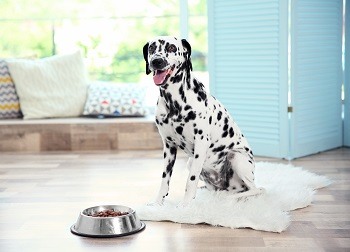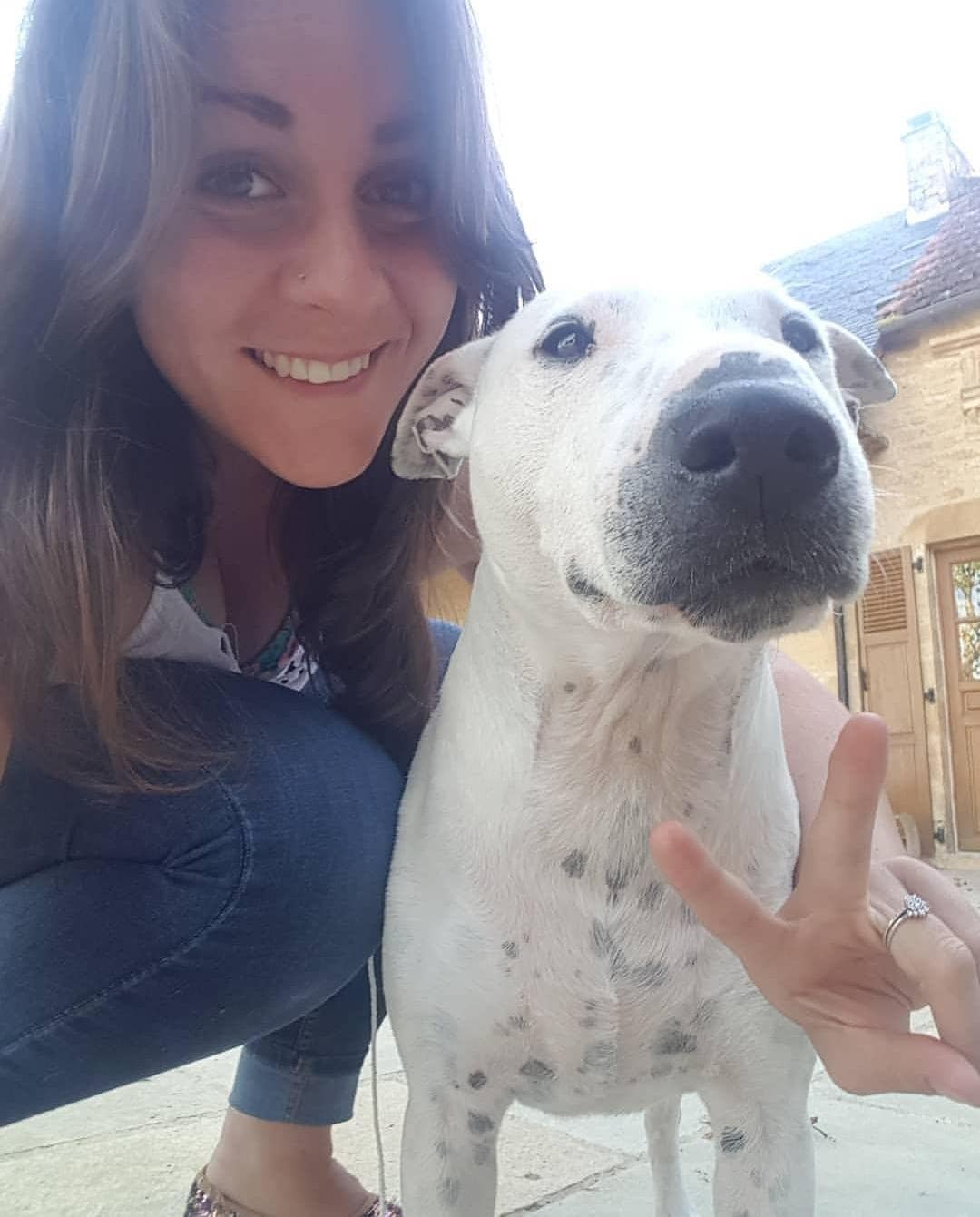Why Does My Dog Lick the Couch? 7 Reasons & How to Stop It
By Dean Eby
Updated on
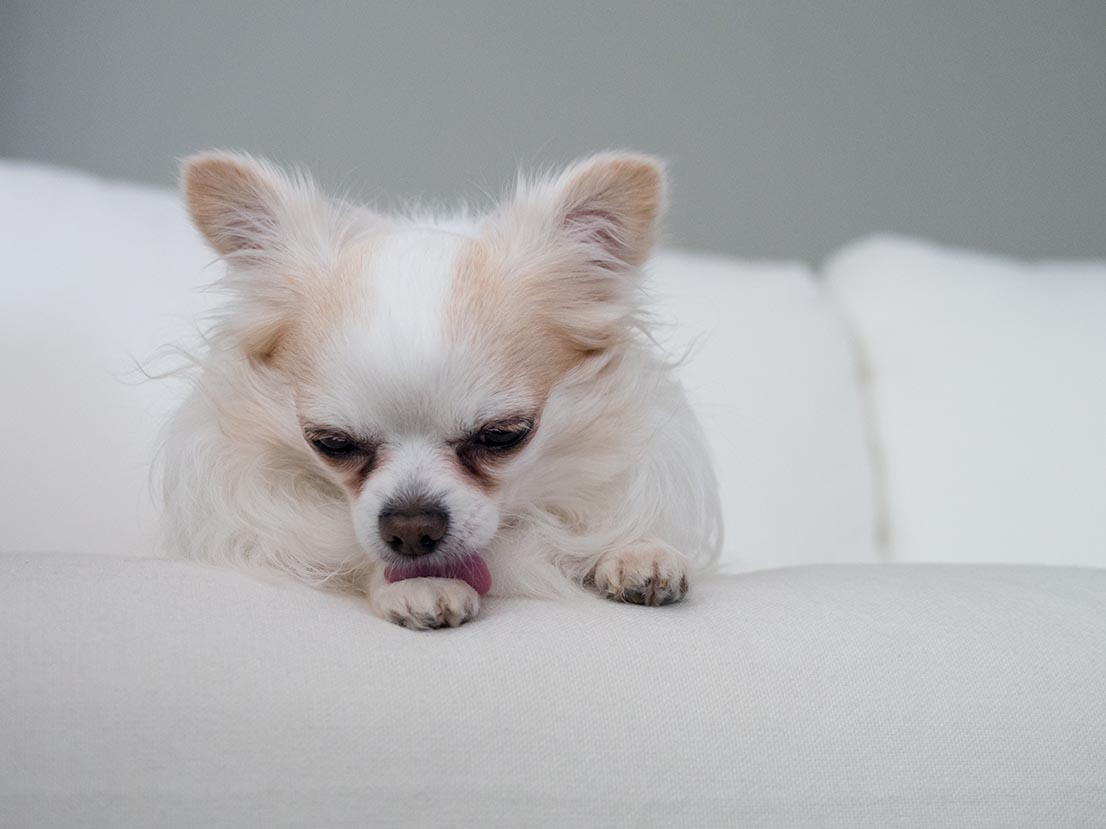
When you first notice your pooch licking the furniture, no red flags immediately come to mind. It seems like normal behavior when you only see it in moderation. After all, dogs just like to lick things! Keep in mind, they don’t have hands like we do. Rather, with four legs, their only real tool for physically interacting with the world is their mouth. As such, it’s not generally a problem for a dog to be licking certain items.
However, it can definitely become a problem when the licking becomes constant and compulsive. But why does such behavior manifest? Is this normal or is there some sort of underlying problem you should be checking for? In truth, there are many reasons why your dog might be licking the couch. Some of them are rather normal, others are cause for concern. Once we discuss all seven, we’ll even cover four solutions that might help you put an end to that incessant licking!
Why Does My Dog Lick The Couch All The Time? (7 Reasons)
1. Something on the Couch Tastes Good
One of the most obvious reasons is that there’s something on your couch that tastes good to your dog. What do you do when you find something you enjoy the taste of? Well, generally, you probably just eat it. But if it’s certain things, such as a lollipop or ice cream cone, you’ll lick it instead. Granted, you’re probably not going to lick your ice cream off the floor, but your dog is working with limited tools here.
Couches can hold onto flavors for quite a while. If you spill a sticky, sugary drink on the couch, you might erase the stain, but the smell and taste are still there for your dog to pick up, even if you can’t tell. Additionally, crumbs from foods you eat while sitting on the couch can collect in the fabric of the couch. Some of the smallest crumbs get caught in the weave of the fabric, and your dog could be tasting those as well.
Unfortunately, it might not even be something you’ve spilled on the couch. Some fabrics, including suede and microfiber, can actually taste and smell attractive to your dog. Depending on what your couch is made of, your dog could just love the taste of your couch’s material.
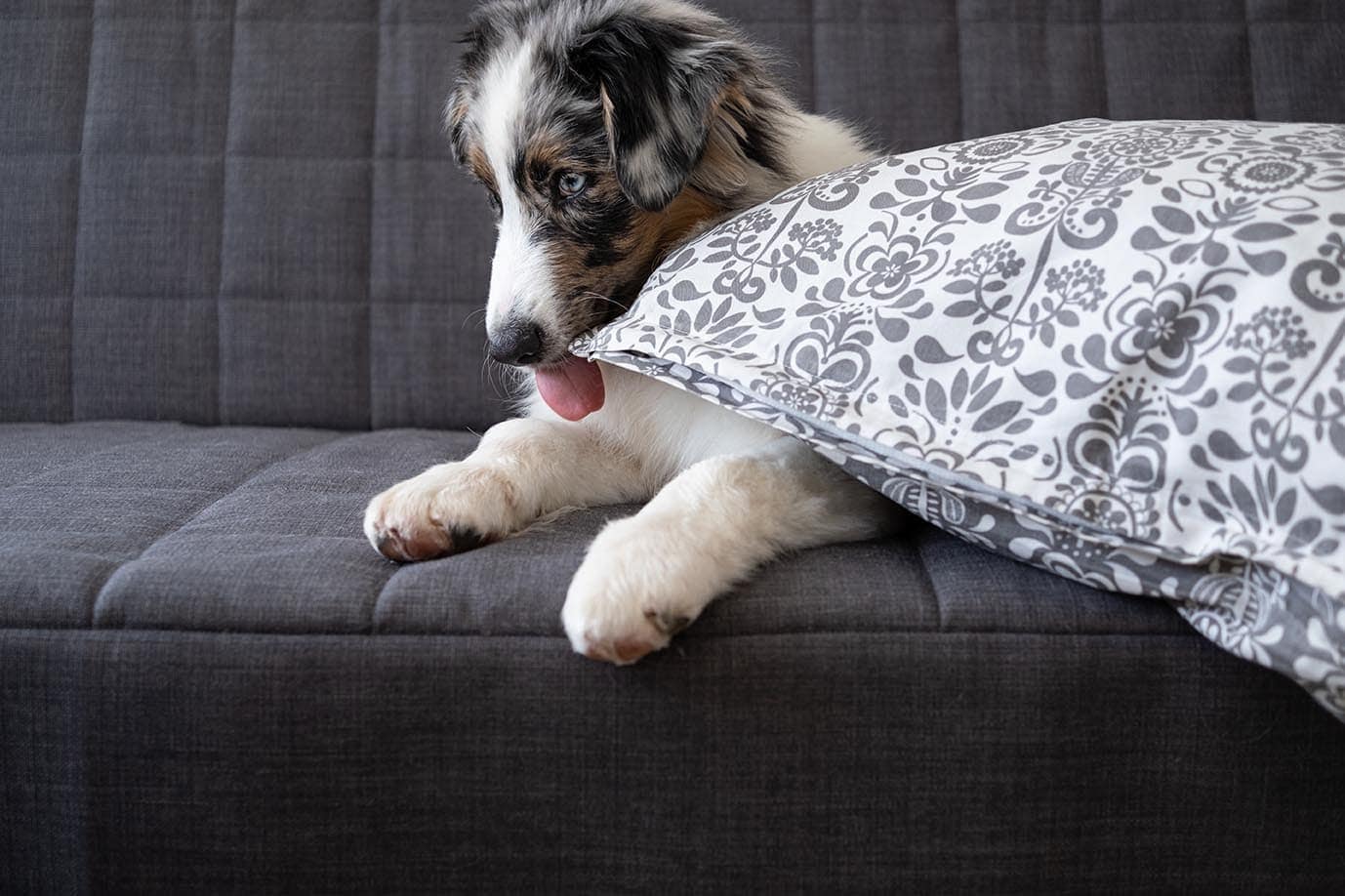
2. A Bad Habit Has Formed
Most of the reasons on this list have an actual cause to point to, such as flavor on the couch or underlying health concerns. But sometimes, your dog has simply formed a bad habit of licking the couch and there’s no deeper problem that’s causing it. Just like you can form bad habits pretty easily, so can your canine. The good news is that it’s not a health concern for your pooch to form a mild bad habit like licking the couch. The bad news is that you’ll have to untrain this behavior if you want it to stop.
3. Behavioral Conditions Like OCD
We often think of obsessive-compulsive disorder as a human condition, but it can also affect your dog. Signs that the licking is caused by OCD include:
- Licking with aggression or intensity
- The dog seems spaced out while licking
- You can’t distract your dog while they’re licking
OCD can be caused by the dog being raised in certain environments, but even pooches from completely healthy homes can experience OCD. Once the behavior is engrained, even changing the dog’s environment is unlikely to break it.
Dogs can develop OCD when they live in extremely restrictive situations. For instance, if your dog is constantly chained up in the yard with little room to move. It’s also common in dogs that aren’t getting exercise or canines that have been cut off from socialization. Dogs in such situations often revert to a stereotypy, which is a single behavior without function that the dog continuously repeats without being able to stop, such as compulsively licking the couch.
Again, OCD can happen in dogs with perfectly healthy upbringings and environments also. Some medications might be able to aid with this problem, including anti-anxiety medications. Behavioral modification therapy will likely be necessary to put an end to it.
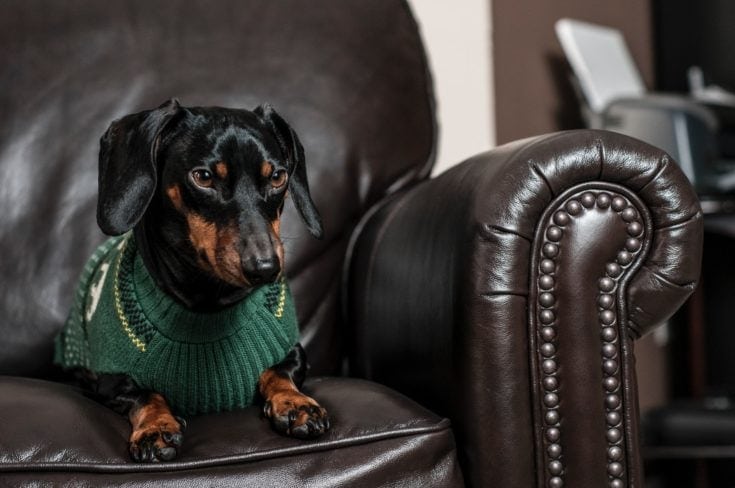
4. The Texture Is Irresistible
It doesn’t have to necessarily be the flavor of the couch that your pooch is going for. Rather, it could be the texture of the textile against its tongue that’s making them keep licking so much. Dogs’ tongues are more in tune than our own since they use them for so much. If your dog is attracted to the texture of your couch rather than the taste, then you might need a couch cover or a new sofa!
5. There’s an Underlying Health Condition
Many causes of your dog’s incessant licking are harmless and not a reason for serious concern. That’s not always the case, though. Some types of health conditions could manifest as compulsive licking, offering you a sign and a clue to help uncover the condition your dog could be facing. Often, when a dog is exhibiting some type of behavior that doesn’t seem quite normal, it’s an indication of a larger underlying problem that needs attention.
If your dog is suffering from pain, dental issues, pituitary gland diseases, or a myriad of other health concerns, it could be causing the licking behavior. This is especially true if the licking is a new behavior or has recently increased in intensity. To diagnose the possible underlying problem, you’ll want to get your vet’s professional help.
6. Your Dog Is Just Bored
Sometimes, there’s no real culprit for you to point to. The reality is, your dog spends a lot of time stuck in your home; probably far more than you do. In such a small space, even if your home is large, it’s easy to become bored. Dogs don’t have as many outlets available for their boredom as we do, so they often turn towards behaviors that we might deem as strange, such as licking the couch to death.
The good news is that if your dog is bored, the remedy is quite simple. You can simply supply your dog with some new toys, stimulating puzzles, games, or just up the exercise until your dog’s excess energy is abated.
7. It Smells Like You
Canines form very close and special bonds with their human counterparts. They love their family and want to be near them all the time. And with their considerably stronger senses of smell, dogs can hone in on scents that we would completely miss. For instance, that spot on the couch where your backside is always sitting probably smells just like you. You do sit there pretty much daily, after all.
More than likely, you never give any thought to your scent on your furniture. But your dog definitely does. When it wants to feel near you, your dog might seek out that smelly spot and lick it to get a taste of you, which could be relaxing and calming for your dog. Thankfully, a good steam cleaning will probably remove most of your scent from the couch, though it’ll probably smell like you pretty quickly again anyway!
How to Stop Your Dog Licking From the Couch
As we’ve discussed, there are a myriad of reasons why your canine could be licking the couch so compulsively. It’s up to you to do some digging and see if you can unearth the underlying cause of your pooch’s behavior. Once you’ve identified the reasons your dog is licking, you can start taking steps to curb the behavior. The following methods will help you cease your dog’s couch licking. Some of these methods are only appropriate for particular underlying causes, though other methods are nearly universal.
1. Bitter Spray
Using a bitter spray is one of the easiest and quickest ways to get your dog to stop licking the couch, regardless of why they’re doing it. Bitter spray is a training aid. It’s a spray that tastes bitter, deterring your dog from wanting to lick the area. Of course, these sprays are totally pet-safe and won’t harm your dog.
Truthfully, we’ve had some hit or miss experiences with bitter sprays, but one spray that’s always seemed to work well for us is Grannick’s Bitter Apple Original Taste Deterrent Dog Spray. Just spray it on the couch where your dog keeps licking and the behavior should stop. It couldn’t be easier!

2. Up the Exercise
One very common reason for dogs to lick furniture is that they’re bored or have far too much pent-up energy. Many of these dogs are stuck in the house for a majority of each day, so it’s easy to understand how this happens. Luckily, it’s an easy problem to remedy by simply increasing the amount of exercise and physical activity you provide for your dog.
You can start by taking your dog on walks or runs once or twice daily. If you have a yard available, try offering your dog more time outside. New toys can also be a great way to alleviate boredom and help your dog expel some of that extra energy. Toys that create engagement like puzzle boxes that make your dog work for a treat are a great idea as they’ll keep your dog both mentally and physically engaged, fully alleviating your dog’s boredom.
There are plenty of toys you can turn to. You can hide treats in certain toys and your dog will work to get them out.
If your dog needs more exercise and you don’t have the time or energy to provide it, then you could try a device such as the iFetch Mini Automatic Ball Launcher Dog Toy. This excellent product will play fetch with your dog for you. All your dog has to learn is how to drop the ball in the big hole. The iFetch will then launch the ball for your dog to retrieve. You can adjust the launching distance to stay within your yard. This will give your dog hours of great fun that’s both physically exhausting and mentally stimulating.
3. Have the Vet Check for Underlying Conditions
Since your dog is limited in the ways it can communicate with you, it can be difficult to know when there’s a problem beneath the surface. Children can tell you when they don’t feel good. Dogs can only show you through their actions, which can often be hard to decipher.
If you can’t seem to figure out what might be causing your dog’s constant licking of the couch, then you might need some professional help. Should the problem be caused by an underlying medical condition, you probably won’t be able to discover it on your own. Your vet is an expert though, so they should be able to pinpoint the root cause and suggest a course of treatment.

4. Behavior Modification Training
Sometimes, problems like too much licking are just behavioral issues. As such, they can be adjusted using behavior modification training. Of course, there are many different ways to perform behavior modification training. You could use positive reinforcement and treats. Also, you could try giving your dog a different thing to lick in place of the couch.
Training to modify behavior can be a tricky road to navigate. You might want to enlist the professional help of a dog trainer for this one. While you can learn a lot online from watching videos about dog training, that’s no replacement for the experience that a professional dog trainer gets from many years of working with lots of different dogs. A good trainer will have many tools in their toolbox that they can use to help modify your dog’s behavior.
Final Thoughts: Dogs Licking Couches
As you can see, there are many reasons why your dog might be licking the couch. It might smell like you, or there might be some hidden flavor within the threads of your furniture. Perhaps your dog has an underlying medical condition, or maybe they have just formed a bad habit. Whatever the reason, there are many ways to remedy the behavior. Do your best to determine the root cause of the licking. Then, you can start thinking about how to treat it. If you get stuck, simply call a professional. Depending on your problem, you might try a vet or a dog trainer. Hopefully, armed with these tips, you’ll be able to put an end to your dog’s licking and have a dry couch once more.
You might also like some of our other top-trending posts:
- Are Pitbulls Good Family Dogs? The Surprising Answer!
- Do Dogs Know When They Are Dying? Here’s What Science Says
- Do Dogs Know When You Are Sad? Here’s What Science Says
Featured Image Credit: funkyteddy, Shutterstock



